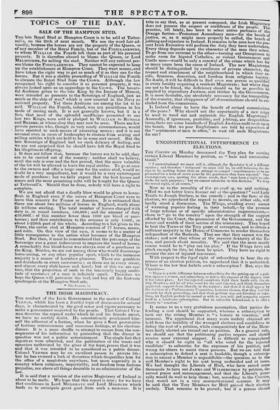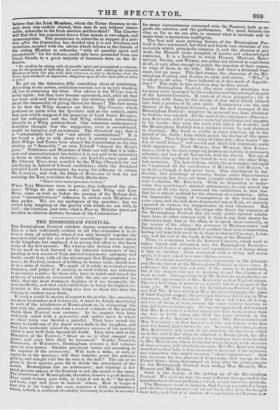UNCONSTITUTIONAL INTERFERENCE IN ELECTIONS.
THE Courier on Monday denounced the Tory plan for ousting certain Liberal Members by petition, as " base and unconstitti- tional."
6, Unconstitutional we must call it, although the Spectator is of a different opinion ; and therefore 6 indignant' we must still be, we still believing the de-
sign to be nothing better than an attempt to compel ' constituencies to he re. presented for a term of seven years by the gentlemen they have rejected.' Our contemporary says, quoting the above words, that ' men have a right to sub- scribe for such purposes;' but we cannot subscribe to this doctrine. We deny the moral right, at all events."
Now as to the morality of the pmeeedi ig, we said nothing. "Had we not better leave honour out the question?" said Lady Teazle to Joseph Surface, in the comedy : and in the farce of the election, we apprehend the regard to morals, on either side, will
hardly stand a discussion. The Whigs, avoiding every means of warming popular feeling in their behalf,—by the promise
of large reforms or of specific administrative improvements,—
chose to" go to the country" upon the strength of the support afforded by the Court, the possession of the Government, and the power and wealth of their section of the aristocracy. They hoped to beat the Tories at the Tory game of corruption, and to obtain a sufficient majority in the House of Commons to render themselves independent of the Radicals. They see that they cannot win the stakes; and now they whine at the superior dexterity of the To- ries, and preach about morality. We said that the more manly course would be to "play out the play." If the Whigs have not pluck enough for this, let them be quiet. They have no right to assume the airs of injured innocence.
With respect to the legal right of subscribing to bear the ex- penses of an election petition, we apprehend that it is undoubted. Where is the law that forbids such a subscription ? But, says the courier— There is a wide difference between subscribing- for the getting-up of a peti- tion against a return, and subscribing to defray the expense of the inquiry after it lets taken place. Let the rejected candidates tight their battle with the sit.
ting Members, and let all who voted for the said rejected, and think themselves aggrieved, support them liberally in the contest; and then if it shall appear by the decision of a Parliamentary Committee, however chosen, that they bad fair grounds for their proceeding, and that their petition was not frivolous or vexa- tious, let English pockets he opened as wide as you will, and sympathy express itself in a handsome subscription. But to subscribe beforehand, is to offer a bounty to' vexation."
It seems to us a very gratuitous assumption, that parties de- fending a seat should be supported, whereas a subscription to turn out the sitting Member is "a bounty to vexation," and immoral. We apprehend that many seats unduly obtained are held from the inability of the wronged electors and candidates to defray the cost of a petition, while comparatively few of the Mem- bers fairly elected arc turned out on petition. As a general rule, we should say that the petitioning parties require and should receive most external support. it is dillicult to comprehend why it should be right in "all who voted for the rejected candidate" to subscribe for the expenses of his petition, and wrong for others to assist these persons. But we are told that a subscription to defend a seat is laudable, though a subscrip- tion to unseat a Member is unjustifiable—the question as to the said Member's right to his seat being undecided and at issue. We had thought the Liberals of Hull, who have raised some thousands to turn Out JAMES and WILBERFORCE by petition, de- served praise and encouragement, and that the Liberals gene- rally would do well to help them; but, according to the Courier, they would act in a very unconstitutional manner. It may be said that the Tory Members for Hull gained their election unduly. That remains to be proved; but if a person should believe that the Irish Members, whom the Tories threaten to un- seat, were also unduly elected, then may he not, without immo- rality, subscribe to the Irish election petition-fund? The Courier will find that his argument drawn from morals is two-edged, and unmanageable. The permission to subscribe in support of a peti- tion after the Committee has decided that it is not frivolous and vexatious, coupled with the advice which follows to the friends of the sitting Member to subscribe "with all possible spirit and promptitude" for his defence, could only have proceeded from one whose friends in a great majority of instances were on the de-
fensive.
"To retaliate by raising with all possible "spirit and promptitude a subscrip- tion for the purpose of defending the seats attacked, and enabling the returned Members to have fair play with their witneRses, is only to discharge what the Tories have rendered an imperative obligation upon all who have gold or silver to give." To act on the defensive, falls something short of retaliating. According to our notion, retaliation consists not in merely warding off, but in returning the blow. Our advice to the Whigs was to strike again : but they have become squeamish, and, after all that has been said and done during the late election, talk sensitively about the immorality of giving thrust for thrust ! The fact seems to be that the Whig weapons are blunt. The Courier, which professes to quote what the Spectator said on the subject, omits that part which suggested the propriety of Lord JO1IN RUSSELL and his colleagues and the rich Whig noblemen subscribing liberally to a Whig petition-fund. Our courteous contemporary doubtless thought that the suggestion, even at second-hand, would be intrusive and unwelcome. The Standard says that it is "substantially fair," but " not strictly constitutional." It is too broad a joke to talk about what is strictly constitutional. Both Whigs and Tories have abused the Constitution in the late election as " damnably " as ever Falstaff "abused the King's press." Noblemen and Ministers of State are told that it is inde- cent and unconstitutional (we believe it is not said to be unlawful) in them to interfere in elections : yet Lord CLANR1CARDE and Mr. SPRING RICE were assailed by the Whig Chronicle for not interfering in behalf of Liberal candidates ; while the Standard defended Lord LONDONDERRY for using his influence to return Mr. LIDDELL, and took the Duke of RUTLAND to task fur not assisting the Tory candidate for North Derbyshire.
"Mame inter muros peccatur, et extra."
When Tory Ministers were in power, they influenced the elec- tions; Whigs do the same now ; and both Whig and Tory
Peers, since as well as before the passing of the Reform Act, exert " unconstitutional " influence to return such Members as they prefer. We are not apologists of the practice ; but we cannot help laughing at the gravity with which we are told, in 1837—the elections just over—that a Peer or Minister must not interfere in election matters, because of the Constitution !



























 Previous page
Previous page